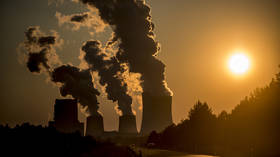‘Horror chart’ suggests Germany on brink of huge energy crisis

Germany is heading for a “huge energy crisis,” a senior editor at one of the country’s most influential newspapers, Die Welt, warned on Wednesday.
“Not only [are] gas prices near record highs, but electricity prices in particular are signaling stress,” Holger Zschaepitz, a senior editor on the daily's economic and financial desk, wrote on Twitter.
In what he called a “horror chart” that he posted with his tweet, Zschaepitz showed that the price of electricity had reached almost €400 per megawatt hour on the energy exchange, or €0.40 per kilowatt-hour. If consumer prices reflected such market rates, Germans would be paying around €0.80 per kilowatt-hour rather than the current €0.30, including taxes and fees. However, such a sharp increase would be socially explosive, Zschaepitz suggests. Meanwhile, in such a case energy companies would no longer be able to produce competitively, he adds.
This horror chart suggests that #Germany is heading for a huge energy crisis. Not only are gas prices near record highs, but electricity prices in particular are signaling stress. pic.twitter.com/8zxueSGhxh
— Holger Zschaepitz (@Schuldensuehner) July 27, 2022
Electricity prices in Germany are influenced by the price of natural gas, which is the source of 15% of the country’s electricity, according to official statistics. Gas prices have nearly quadrupled this year, primarily due to shrinking flow from Russia, the continent’s major supplier.
The price crunch has already led to a partial nationalization of one of Germany’s largest energy supply companies. The German government announced last week it would acquire a 30% stake in Uniper after the company asked for a bailout, citing “extreme financial pressure” caused by the reduced Russian natural gas deliveries.
The curtailment of gas flows meant that rather than being able to fully rely on its long-term contracts at a fixed price, Uniper has recently been forced to buy gas on the spot market at a much higher price to make up for shortages.
According to a recent report by Bloomberg, European energy firms are racking up debt to cover the soaring costs, with their liabilities having reportedly reached over $1.7 trillion.
For more stories on economy & finance visit RT's business section












